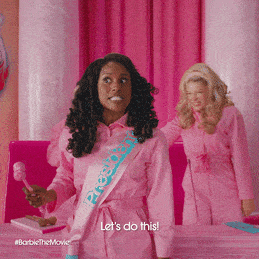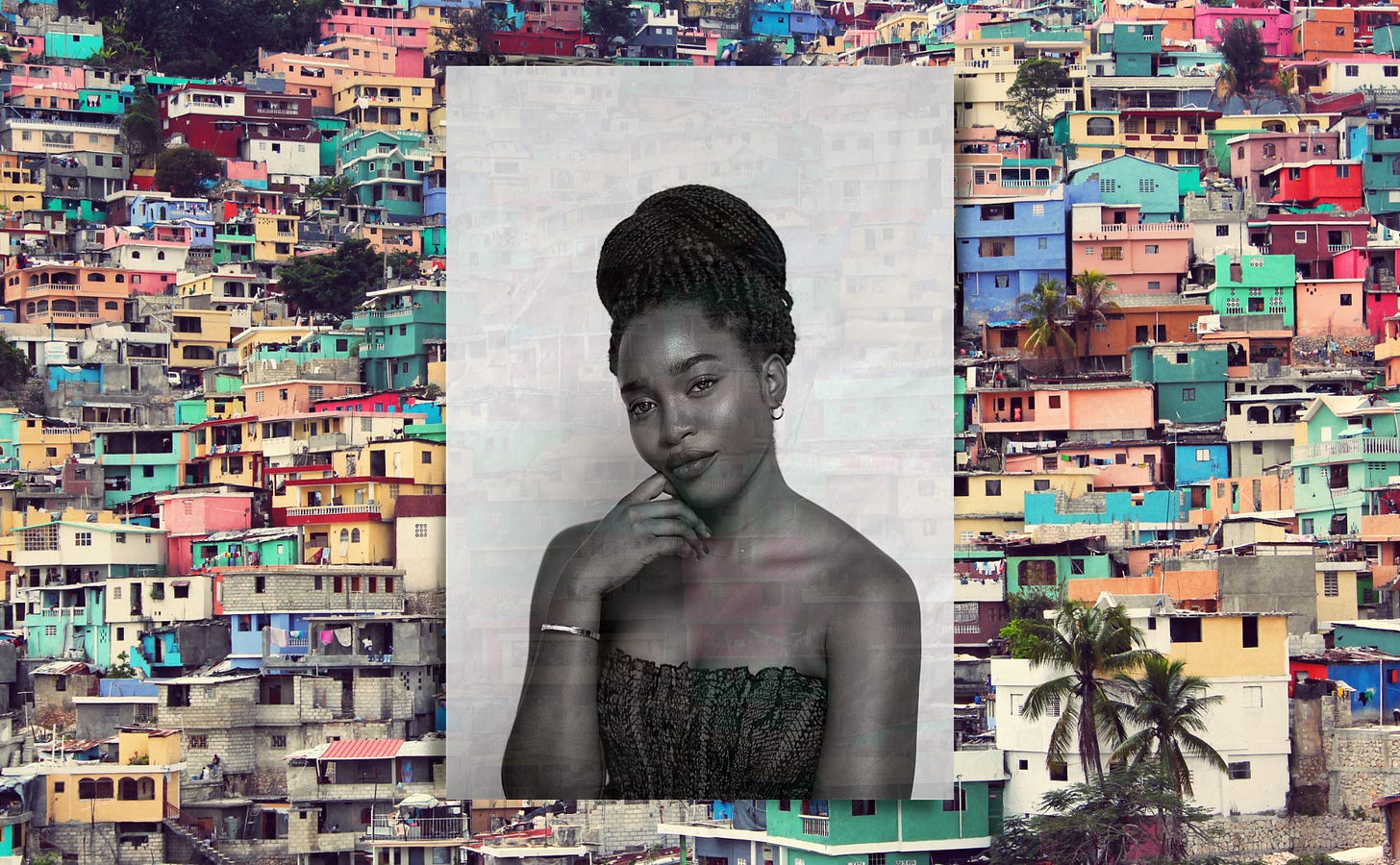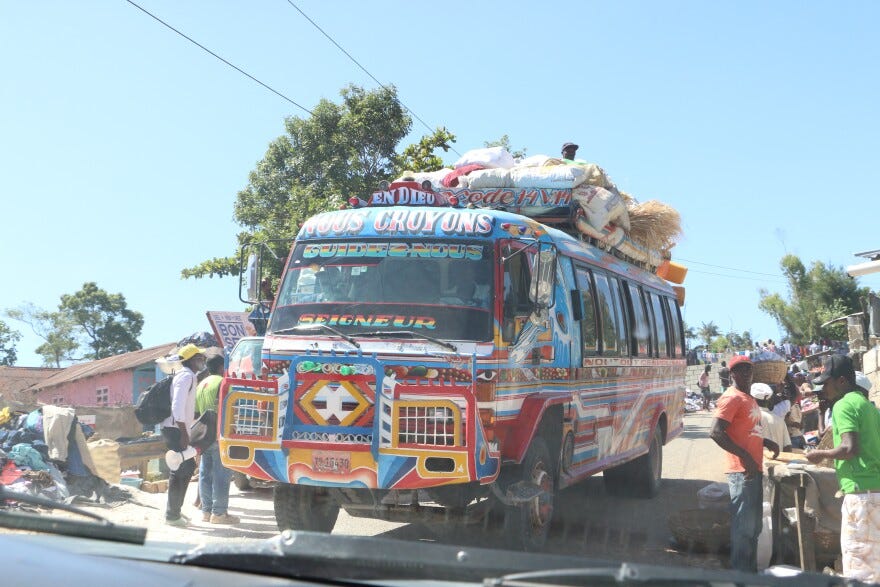This Barbie Doesn't Wear Pink, She Wears Blue, Red & Yellow
"Where are you from?" is a loaded question
Hey yall,
It was an extremely hot day when I drove up to the Regal Jack London theater in Oakland to see Barbie last week. I just knew I’d be disappointed by the moviegoers lack of pink attire, because, well, Oakland. However, I was pleasantly surprised to see pink mini dresses, pink Telfar bags, and previously bleached blonde kinky curls now shaded in hot pink. I’m not sure what I was preparing to see, but as a marketer by day, I was there mainly in solidarity with the marketers who did everything in their power to shove this movie down our throats via what seemed like 1,000 different collabs with brands across the globe. But by the time the movie was over, I was plotting when I could go see it again.
Yes, it was that good! The inclusivity in both body size and ethnicity was refreshing without feeling like pandering, and the message was self-deprecating but also smart. Our girl Issa is in it. Ryan Gosling sings. It’s women’s empowerment on steroids. I highly recommend it.
Also! I was featured in an article for ESSENCE magazine where Black millennial women shared their current frustrations and triumphs (lawd, what is “vibing”??) with dating. There may or may not be a soft launch from me in there 👀. Only one way to find out.
This Week’s Story
Being a second generation immigrant is…strange. There is the beauty of having a culture you can identify with and go home to, but there is also the frustration of never quite feeling like fully belong to it. As a second-generation Nigerian-American, I know the struggle. Writer Nadia Alexis shares her love for her Haitian heritage, and the ups and downs that come with trying to fit in.
Enjoy,
Anayo Awuzie
EIC of Carefree Mag
Adventures Unknown: “Where Are You From?” Is A Loaded Question
by Nadia Alexis
We almost blend in.
The blue, red, and yellow of the dresses Ma made my sisters and me wear to match the colors of the buses here. This is our second time visiting Haiti as a family, and I am 11 or 12 years old. Ma doesn’t make enough money for us to come every year like some families.
Paved streets disappear when we leave Port-au-Prince. After illegibly scribbling something like “Right now we’re on a bumpy bus,” I give up trying to write my diary and record things with my other senses. Smells of half-eaten mangos, pigs gathered on the side of the road, burning charcoal. Sights of people dressed in bright colors as if they were celebrating, voices booming like drums.
The bus is filled with Kreyol and laughter. For most of the trip, I don’t speak. Each phrase I overhear and understand helps make the ride go by a little bit faster. I can’t remember them clearly, but knowing Haitian people, conversations about politics usually linger in any space they’re in. I imagine Prezidan Ayiti was on the tip of people’s tongues as they reflected on President René Préval’s tenure in office at this time. I resist the urge to lean over to Ma and ask her to translate. The words I can’t give meaning to become music, and this time I’m okay with this dance.
Ma is still wearing her nursing uniform and tired eyes even though it’s been hours since she’s been home from the Harlem nursing home she works at. In keeping with the usual, she gets on the phone with my aunt. I quietly shut my bedroom door and bury myself in books and my old purple sheets. One would think I’d be more comfortable with this ritual at the age of 16 but I pray that she forgets I’m here. Moments later she yells for me to get on the phone and I tell her I’m busy. She calls me over again. My bare feet sigh against the cold floor as I make my way back to the living room.
I wonder if she can hear the broken bone in my voice.
I utter the same phrases I used the last time I spoke to her. The way Kreyol sounds when it comes out of my mouth is like a book that doesn’t want to fit in a tight space on a shelf. I use English in place of words my tongue doesn’t know how to carry. I wonder if she can hear the broken bone in my voice.
I’m at JFK airport writing in my diary and wearing the pink ruffle dress Ma bought me. The barrettes in my hair make the strands of my hair move like there’s wind beneath them. The side of my hand darkens as it’s caked with lead residue from the pencil I’m using. I still feel like I have wings and I am five years old. Braids adorned in plastic have a way of making you feel like you’re of sun and clouds.
I glance over at a white family nearby. Somehow I forget to move when I hear them speaking Kreyol like it’s their first language. I look at Ma and then back at the family. I shift in the suddenly uncomfortable chair. I whisper in Ma’s ear, “How do those white people know Kreyol? There’s white Haitians?” Ma laughs and nods.
I look down at my hands, silently wondering if they’re more Haitian than me. I tug at a braid and don’t look at them again until I have to.
It’s a little over two years since I graduated from college. I’m at a Fourth of July cookout in Harlem and the wind is blowing, touching my skin like it’s hugging me. I notice the red, white, and blue everywhere. The star-spangled cake, plates, and napkins. A well-dressed couple sits nearby talking and laughing loudly. I can’t help but smile.
When their accents fall on my ears I walk over to them. “Where y’all from?” I already know the answer. The man smiles at me like he’s happy I asked and responds “Haiti!” With more enthusiasm than I should have, I smile back. “I’m Haitian, too!” His girlfriend smiles and turns her head to make eye contact with him. He looks at me without trying to hide the doubt in his eyes. “Were you born in Haiti?” I pause and try to ignore the familiar throbbing in my chest. “No, I was born here. My parents were born in Haiti.” After an uncomfortable two-second silence, I watch him smirk. “You’re not really Haitian then. You’re American.”
My smile fades as quickly as it arrived. Suddenly my throat is a ruptured bloodline.
I lie in bed and think of how it’s been nine years since I was last in Haiti. Nine years. A year out of college and a couple of years out of a relationship that destroyed my connection to significant parts of myself while simultaneously affirming that I am indeed connected enough to Haiti by way of my parents. I consider ways to hold onto what’s left of that trip in my chest. I’m having trouble remembering. But I remember the communal space of the rivers and how my baby cousin cared nothing about how Haitian I was, just that he could clutch my earrings and bracelet as much as he desired. All the journals I wrote in as a kid— where I recorded these moments—are gone. No one, including myself, seems to know what happened to them.
I consider ways to hold onto what’s left of that trip in my chest.
I find Carimi on my playlist and move my body to the memory of the dance moves I saw in the video, relieved I can still mentally translate some of the lyrics. Sometimes holding on to what I know keeps me from falling. I think of the Nigerian man I met who’s been dancing kompa for years. I think of how he laughed at my unknowing.
I’m sitting in the Baptist congregation with my good friend, and I’m 16 years old. I came dressed in a long dress and church shoes. I’d rather be wearing pants, but there are rules here. When church is over, she introduces me to a man whose face is a treasure I want to touch. He reminds me of Dwayne from A Different World, and he’s much too old for me, but I am crushing anyway. In an accent more Haitian than my nonexistent one he says, “You came all the way out here from Harlem? That’s dedication, wi!” I respond, “It’s nothing. The train ride is only 40 minutes. Plus I need a new church, so it’s worth it to me!” He asks, “Do you know how to speak Kreyol?”
My heart makes a familiar sound as I search my mind. To start I say, “Wi! Mwen pale Kreyol. A little. But I understand more than I can speak.” I say this with my hands until he believes me. I’m never certain he does. I pretend I’m looking in the mirror as I consider letting more words roll into the air. But I don’t. It’s easier not to step into the fire.
In the years that follow, I join Haitian meetup groups and play with the idea of taking kompa dance lessons and attending Kreyol language classes, all in an effort to rid myself of an emptiness I no longer wish to be accustomed to. At 30, I’m still not fluent in the language, but each experience I’ve walked or fallen into has brought me to a place of feeling that my kind of Haitian is Haitian enough.
Enjoyed this week's storyletter? Tap the heart & share it! 😍
Share on Twitter | Share on Facebook | Share via email | View past stories
Originally published on OnSheGoes












